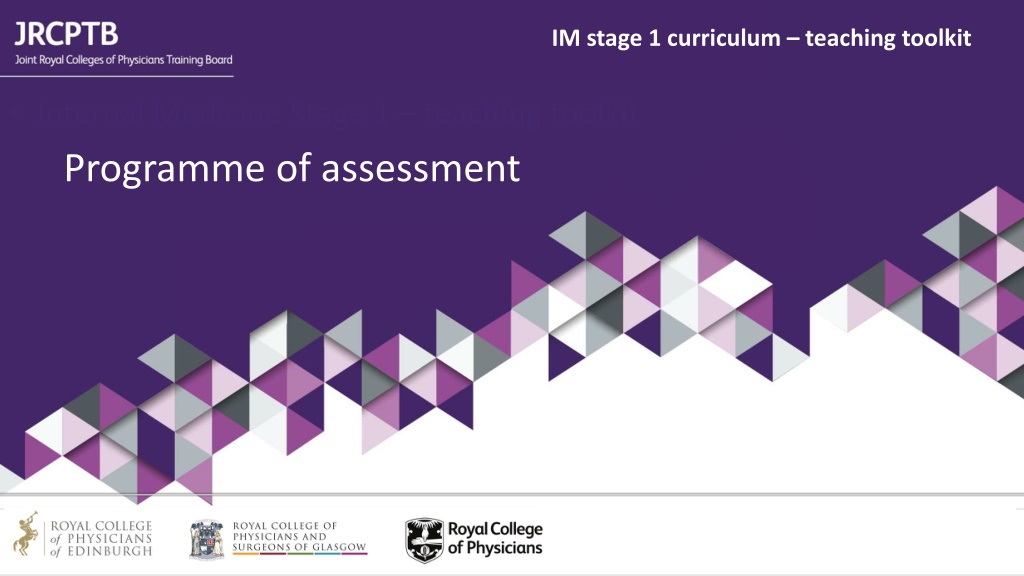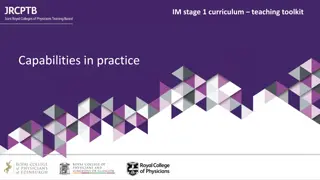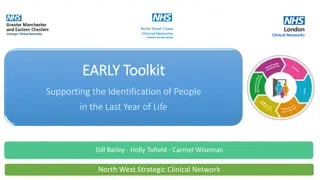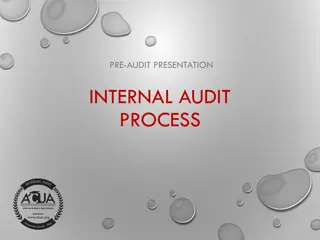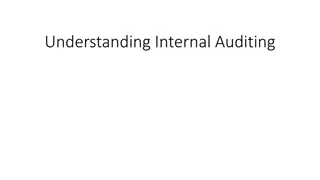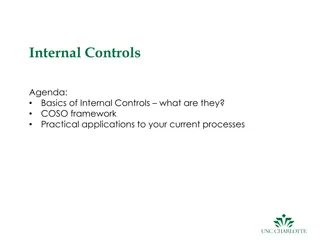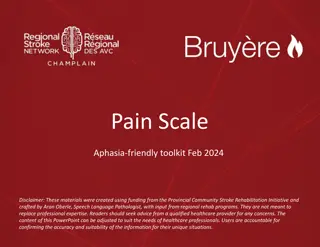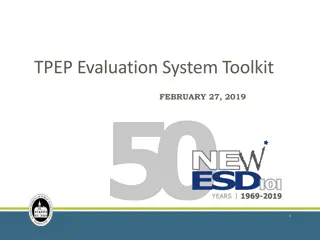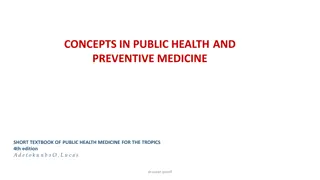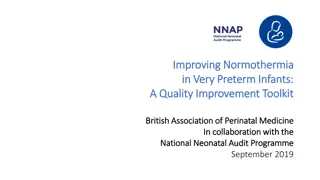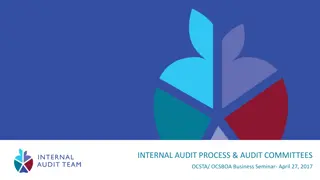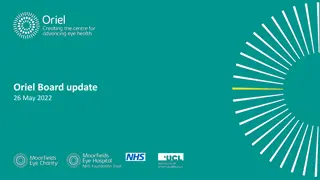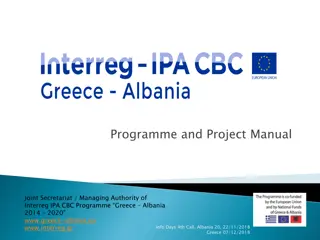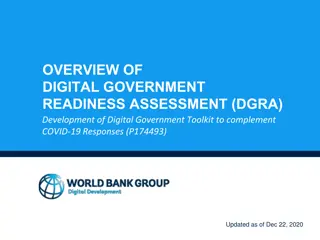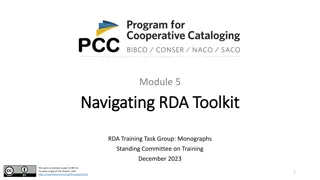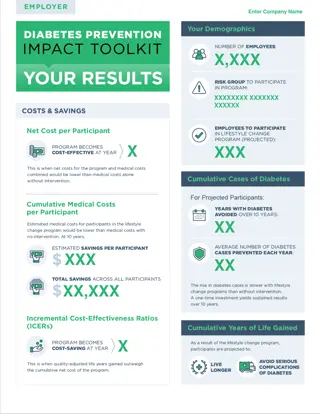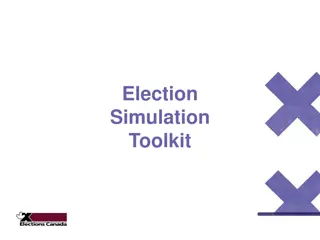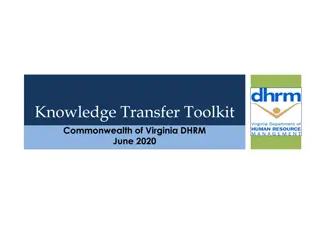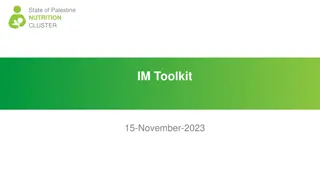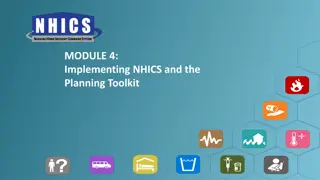Internal Medicine Stage 1 Programme of Assessment Toolkit
The programme of assessment for Internal Medicine Stage 1 emphasizes the importance of professional judgement in assessing learners' progress and performance. It includes MRCP(UK) assessments, workplace judgements, and feedback mechanisms to support decisions on trainee progression and completion. Assessors play a key role in making accountable professional judgements, ensuring learners meet expected levels of performance. Assessment of capabilities in practice involves evaluating a range of skills and behaviors to determine a learner's suitability for specific responsibilities. Global assessment anchor statements provide feedback on progression, indicating whether expectations are met for advancing to the next stage of training.
Download Presentation

Please find below an Image/Link to download the presentation.
The content on the website is provided AS IS for your information and personal use only. It may not be sold, licensed, or shared on other websites without obtaining consent from the author. Download presentation by click this link. If you encounter any issues during the download, it is possible that the publisher has removed the file from their server.
E N D
Presentation Transcript
IM stage 1 curriculum teaching toolkit Internal Medicine Stage 1 teaching toolkit Programme of assessment
Programme of assessment Programme of assessment The programme of assessment for Internal Medicine stage 1 refers to the integrated framework of: MRCP(UK) assessments in the workplace (both formative and summative) judgements made about a learner during their approved programme of training
Programme of assessment Programme of assessment The programme of assessment includes how professional judgements are used and collated to support decisions on progression and satisfactory completion of training The programme of assessment emphasises the importance and centrality of professional judgement in making sure learners have met the learning outcomes and expected levels of performance Assessors make accountable professional judgements
Programme of assessment Assessment of capabilities in practice Assessing CiPs involves looking across a range of different skills and behaviours to make global decisions about a learner s suitability to take on particular responsibilities or tasks Clinical supervisors provide vital feedback on trainee performance throughout the training year This important feedback, along with that from others who contribute to assessments, support the educational supervisor to make CiP entrustment decisions
Programme of assessment Global assessment anchor statements Feedback will include a global rating in order to indicate to the trainee and their educational supervisor how they are progressing Supervised learning events, workplace based assessments, and multiple consultant reports include global assessment anchor statements Below expectations for this year of training; may not meet the requirement for critical progression point Meeting expectations for this year of training; expected to progress to next stage of training Above expectations for this year of training; expected to progress to next stage of training
Programme of assessment End of training year assessment Towards the end of the training year: trainees make a self-assessment of their progression for each CiP and record this in the ePortfolio with signposting to the evidence to support their rating educational supervisors review the evidence in the ePortfolio, including workplace based assessments, feedback received from clinical supervisors (via the MCR) and the trainee s self- assessment
Programme of assessment Multiple Consultant Report This form is designed to help to capture the opinions of consultants who have supervised the trainee in a clinical setting The MCR should be completed within three months of the end of placement Respondents should provide feedback on the doctor in training s progress, using global anchor statements, against the CiPs It may not be possible to complete all domains, but respondents are encouraged to complete assessments for all CiPs that are relevant to the supervision of the trainee for that particular placement
Programme of assessment Multiple Consultant Reports The multiple consultant reports are vitally important in supporting educational supervisor judgements Detailed comments must be given to support any rating of below expectations Comments are encouraged for all other ratings, particularly to inform areas of excellence
Programme of assessment End of training year assessment educational supervisor report Educational supervisors record their judgement on the trainee s performance in the educational supervisor report, with commentary
Programme of assessment Educational supervisor judgements For generic CiPs the educational supervisor will indicate whether the trainee is meeting expectations or not, using the global anchor statements Below expectations for this year of training; may not meet the requirement for critical progression point Meeting expectations for this year of training; expected to progress to next stage of training Above expectations for this year of training; expected to progress to next stage of training Trainees will need to be meeting expectations for the state of training as a minimum to progress to the next training year
Programme of assessment Educational supervisor judgements For clinical CiPs, the educational supervisor will make an entrustment decision for each CiP and record the indicated level of supervision required with detailed comments to justify their entrustment decisions The educational supervisors base their entrustment decisions primarily on the MCR, and also on the evidence within the trainee s ePortfolio (eg MSF, WPBA, SLEs)
Programme of assessment Level descriptors for clinical CiPs Level 1 Entrusted to observe only no provision of clinical care Level 2 Entrusted to act with direct supervision: The trainee may provide clinical care, but the supervising physician is physically within the hospital or other site of patient care and is immediately available if required to provide direct bedside supervision Level 3 Entrusted to act with indirect supervision: The trainee may provide clinical care when the supervising physician is not physically present within the hospital or other site of patient care, but is available by means of telephone and/or electronic media to provide advice, and can attend at the bedside if required to provide direct supervision Level 4 Entrusted to act unsupervised
Programme of assessment Annual Review of Competence Progression (ARCP) The ARCP will be informed by the educational supervisor report and the evidence presented in the ePortfolio The ARCP panel make the final summative judgement on whether the trainee has achieved the generic outcomes and is capable of performing at the designated level of supervision for each clinical CiP The ARCP panel will determine whether the trainee can progress in accordance with The Gold Guide
Programme of assessment Evidence of progress The internal medicine stage 1 curriculum details the methods of assessment that could provide evidence of progress in the integrated programme of assessment The requirements for each training year are stipulated in the ARCP decision aid
Programme of assessment Practical activity Akon is an internal medicine stage 1 trainee, who is coming towards the end of her first year You will shortly be asked to review evidence from Akon s portfolio When supervising a trainee you will clearly know your trainee. The following video is designed to give some indication from those you work with on Akon s performance this year
Programme of assessment Practical activity - video Online presenters: Please view the video on the website, located just below this presentation. (You may need to press the Esc key on your keyboard to exit the full-screen view.) When the video is done, please return to this presentation.
Programme of assessment Practical activity - supervisors In your groups review and discuss the following evidence: Trainee s self-assessment against the CiPs MCR report MSF self-assessment and MSF summary
Programme of assessment Practical activity - supervisors In your groups discuss the evidence you have seen: Do you feel that there are any CiPs that Akon may be providing good evidence towards? Are there any CiPs that would require further evidence? If so, what evidence might this include?
Programme of assessment Practical activity - trainees In your groups, discuss the evidence you have seen: Do you feel that there are any CiPs that Akon may be providing good evidence towards? Are there any CiPs that would require further evidence? And if so what evidence might this include? What advice might you give Akon to prepare for her appraisal discussion?
Programme of assessment Practical activity plenary Which CiPs were easier to discuss? Why? Which CiPs were more difficult to discuss? Why? For the CiPs that were more difficult to discuss/decide, where might you find further evidence to help to support your decisions?
IM stage 1 curriculum teaching toolkit Critical progression points
Programme of assessment Critical progression points There are two important progression points during Internal Medicine stage 1 training: End of IMY2 End of IMY3
Programme of assessment IMY2 At this stage the trainee will be stepping up to become the medical registrar It is essential that supervisors are confident that the trainee has the ability to perform in this role The ARCPat the end of IMY2 will play an important role in determining individualised, supportive plans for transition to the medical registrar role. Some trainees may require a period of time in a supportive training environment with the supervising physician readily available
Programme of assessment MRCP(UK) and IMY2 MRCP(UK) part one should be achieved by the end of IMY1 All parts of MRCP(UK) should be achieved by the end of IMY2 Failure to pass full MRCP by the end of IMY2 will result in an ARCP outcome 2 Passing MRCP(UK) is neither necessary nor sufficient to act as medical registrar. If a trainee holds MRCP(UK) by the end of IMY2 but in the opinion of their supervisors are not capable of acting as medical registrar, they should not progress or should only do so with enhanced supervision
Programme of assessment IMY3 The trainee must be signed off for all generic and clinical outcomes and practical procedures The trainee must complete all parts of MRCP(UK) A satisfactory ARCP outcome will be required for entry to specialty training and further Internal Medicine training The educational supervisor report will make a recommendation to the ARCP panel as to whether the trainee has met the defined levels for the CiPs and acquired the procedural competence required for each year of training
IM Stage 1 Curriculum Teaching Toolkit Programme of Assessment End of presentation The JRCPTB is part of the Federation of the Royal Colleges of Physicians of the United Kingdom
